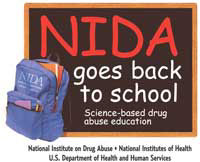In addition to conducting and supporting the lion's share of the world's research on drug abuse and addiction, NIDA works hard to ensure that the results of this research reach key audiences, including educators and the children they teach. In this spirit, September marks the launch of the NIDA Goes Back to School initiative.

"We are excited about expanding the resources available to students and teachers on the science behind drug abuse and addiction," says Dr. Nora D. Volkow, Director of NIDA. "Beyond their educational value, our materials hold the promise of sparking students' general interest in the biological sciences as a possible career choice, while meeting teachers' need for engaging curricula that also fulfill national science education objectives."
This isn't the first time NIDA has gone to school. Its first schools-based educational campaign was launched in 1998 after a dramatic response to newly developed middle school materials presented at a National Biology Teachers Association meeting. The current initiative offers educational materials to help K-12 students learn about the impact of drugs on the brain and the . Some of these materials are self-contained science curricula, satisfying national standards of learning--as well as students' and teachers' curiosity. Others are intended for students--and parents--to access in school or at home. They include age-appropriate magazines that feature real stories of youths who have struggled with drug abuse, Web sites that offer interactive activities and games, brief information sheets on specific drugs or trends in drug abuse, and topic-targeted booklets for handy reference in clearly written Q&A format.
An exciting component of the NIDA Goes Back to School initiative is NIDA for Teens: The Science Behind Drug Abuse, an interactive Web site due to launch as students return to school in September. After doing its homework through focus group testing, NIDA realized it needed a targeted vehicle to reach adolescents ages 11-15. The answer: www.teens.drugabuse.gov. In developing this electronic forum, NIDA worked with a University of Baltimore design team that included youths and was funded through a National Science Foundation grant. This young group of content and usability "experts" reacted to concepts NIDA pitched, many of which were based on the highly successful Heads Up campaign that partners NIDA and Scholastic Magazines, Inc., and reaches more than 8 million students a year. The team also helped NIDA sharpen the site's design, with an eye toward attracting and informing their media-savvy peers.
To announce the launch of this site and promote popular materials that engagingly educate, NIDA sent roughly 40,000 middle and high school science teachers packages that contain:
- a cover letter from Dr. Volkow, also known as Dr. NIDA on the new teen Web site, which offers a Q&A forum with Dr. Volkow;
- an art card promoting the new teen Web site and its features;
- a flyer promoting NIDA's Spanish publications;
- a flyer announcing the NIDA Goes Back to School initiative and noting items of interest to educators: the Mind Over Matter poster series, developed for students in grades 5-9; The Brain: Understanding Neurobiology Through Addiction, a high school curriculum; CD-ROM slide packets on drug abuse topics for educators and students; the recently updated Preventing Drug Abuse among Children and Adolescents: A Research-Based Guide for Parents, Educators, and Community Leaders and its abbreviated version; Scholastic materials jointly developed by NIDA and Scholastic Magazines, Inc.; and two booklets on marijuana--one for teens (Marijuana: Facts for Teens) and the other for parents (Marijuana: Facts Parents Need to Know).
Adults involved in the lives of children--teachers, school nurses and counselors, and parents--are encouraged to download these and other educational resources from www.backtoschool.drugabuse.gov or to order items from the National Clearinghouse for Alcohol and Drug Information at 1-800-729-6686.
"NIDA is back to school to stay," Dr. Volkow says, noting that new curricula are in the works. By next fall, NIDA hopes to offer additional elementary grade curricula for Brain Power! The NIDA Junior Scientists Program, which now has modules for grades 2-3.
"Science education--especially in the field of drug abuse and addiction--is dynamic," concludes Dr. Volkow. "We want to convey that excitement, while keeping students and their parents, teachers, and school counselors informed of the latest findings our research offers."
